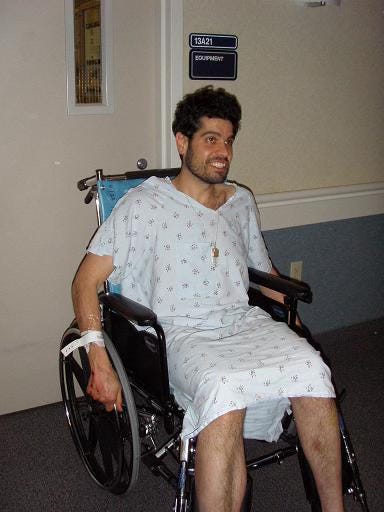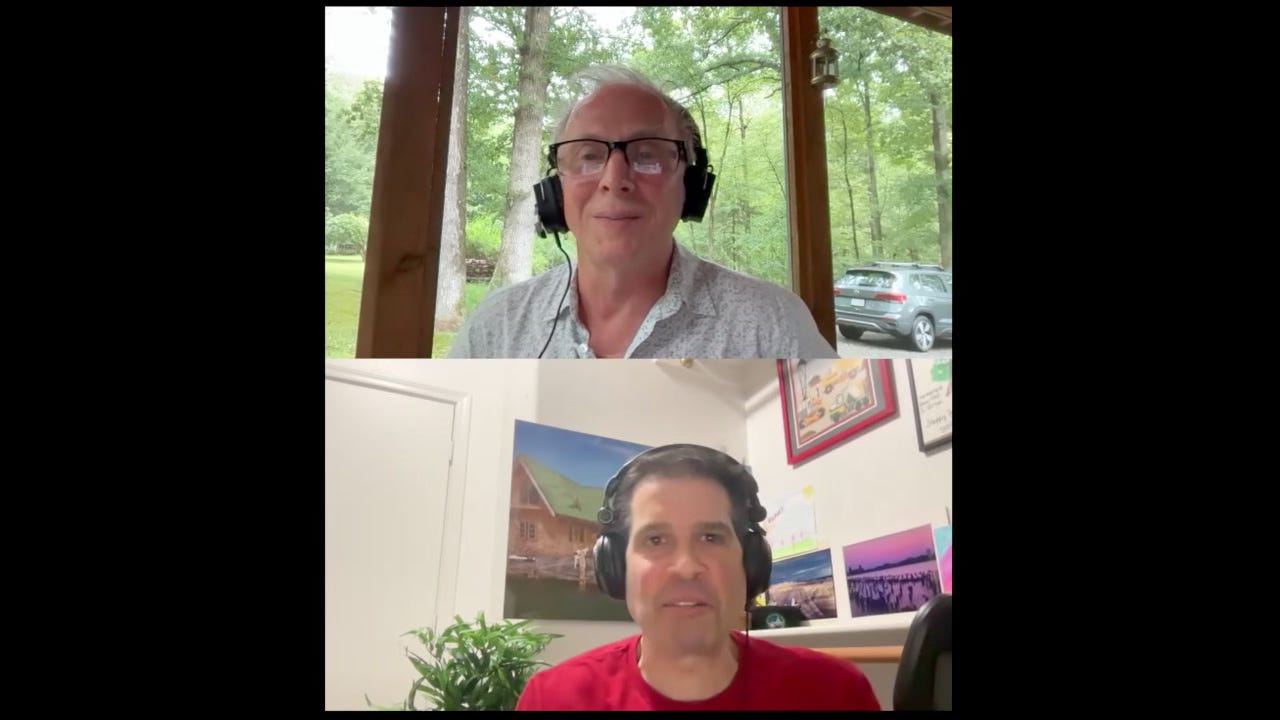When I was 26, I'd signed with "Birthright Israel" for a free, two-week bicycling tour of Israel, only to realize one night that I didn't want to go. I’d never practiced Judaism, and even though it said that wasn't required, I felt strange about taking a trip to visit "the holy land" with other Jews. I guess I was worried they'd smell my agnosticism.
With five weeks to go, I called the agency and they said if I canceled, I'd lose my deposit, $1,000—a "f**k-ton" of money at the time, if you'll pardon my French.
"You sure I can't quit?" I begged the Jewish lady with all the Jewyness I could muster.
"Unless it's a medical emergency, you can’t. That's why we require a deposit, Michael."
I hate when strangers called my by my full name. It only happens when I use my birth certificate, which uses a name my mom ripped off from some "archangel of god," a Christian entity (which felt ironic now that I was trying to get out of a Jewish contract).
I hung up, resolved to go on the trip, only to be outed by religious freaks as a free-loading non-believer. I was sure it was going to be just like Hebrew school, a program I'd quit after only two years, thanks to my utter disinterest in all things religion.
I wasn't against religion, but I also wasn't for it. Religion was how the Westboro Baptist Church justified marching at gay funerals with "God Hates F**s" signs. Religion had justified 9/11. Religion had empowered colonialism. Count me out.
I proceeded to plan for the worst while doing my best to train my body for a two-week bike trip to the most sacred1 (and scary) religious spot on Earth. But my heart wasn't in it and I was secretly hoping something would go wrong so I wouldn't have to go.
Be careful what you wish for.
With three weeks to go, I found myself bicycling on a Saturday, enjoying Portland's bike path system, in the best shape I've ever been in. I felt enthusiastic about life as I easily pedaled home after a pleasant breakfast at my favorite restaurant in town.
But my mood changed when I saw a car headed left, from my right, showing no signs of slowing for their stop sign as I coasted towards the same intersection.
But I have the right of way! I thought as I tried to brake and not hit the errant car.
Alas, "fate" was doing its thing. Many clichés ensued. Time slowed. I thought about dying. I got angry at the driver. I heard car-metal crumpling from my body's impact as four of my ribs snapped, also loud, and then my head slammed into the ground.
I didn't pass out, but I was in shock, a state I'd encountered numerous times before, and have encountered a handful since, but I vividly remember asking the EMTs, over and over and over again, "Are my toes moving? Am I paralyzed? Can I walk?"
"We can't answer that. Please hold still and try to be calm," they replied.
"Did the driver stay? He had a stop sign, right? If he didn't, this is my fault and I can't afford you. I’m not letting you take me anywhere unless you tell me he had a stop sign!"
"Seriously? Yes. He ran one. Now stop wriggling so we can tie you to this board."
"Why? Am I paralyzed? Why do you need a board?"
"It's procedure. Relax. We're taking you to the best hospital in the city."
I asked these questions because I'd been "fooled" by EMTs when I was 18, after I passed out in the middle of a busy college building and wound up having to pay $900 for a 2-block ambulance ride they'd tricked me into taking to the ER for tests.
Flash forward to last Tuesday, when we received awful, grave news about a beloved family member. We were all in shock, but the first thing everyone talked about wasn’t “What can help her live?” It was, "How much will this cost?"
This might sound weird, if you aren't American, since this patient does have medical insurance, does pay her premiums on time, and thus should be "taken care of."
But, normal Americans know the truth. As I've learned each and every time I've ever sought help from a car insurance, health insurance, warranty, or any other "you'll be taken care of when you need it most, just pay this premium up front" policy, the burden of proof not only falls on the "victim," who expects and needs the exact opposite treatment, but even if you do get reimbursed, it will take hours of phone calls, being put on hold, asking to talk to managers, and a whole lot of waiting—while bills with “delinquency fees” pile up. It’s scary, anxiety-inducing, and feels intentional.
I came across a quote recently, and I think it epitomizes what is happening all around us. It explains why companies no longer employ humans to call if you have an issue, why we fear fees we thought we'd avoid with our premiums, and why few of us trust government, media, and other institutions we must rely on to keep group morale high:
"We know they are lying,
they know they are lying,
they know we know they are lying,
we know they know we know they are lying,
but they are still lying.2"
I'd like you to think about this sentiment as you continue to watch "two sides" blame each other, while the third side, the rest of us, continue to suffer the consequences of no accountability, unabashed, bald-face dishonesty, and, worst of all, the leveraging of fear and insecurity to further twist the "lesser of two evils" knife in our collective guts.
I keep hearing people talk about “who” will solve this, and that might be the scariest part of this mess. There’s no legislative solution to a culture that thinks greed isn’t really a sin. We’ve monetized everything and anytime someone says, “maybe we’ve gone too far,” a deafening chorus of play-ground tactics explode as defensive money-chasers label that person a communist, socialist, fascist, or worst of all “Un-American.”
The real joke is that most “un-Americans” are proud to live in a culture that doesn’t monetize education, health care, and retirement. They consider taking care of the young, elderly, and frail a feather in their cap. They don’t worship an “Invisible Hand.”
The solution, you ask? It’s to quit taking money when it binds you to actions that affect others in a way you wouldn’t want to have done to you. And this isn’t an argument you can quibble with or defend aloud. It’s between you and your conscience.
In brighter news, after that car accident, I was in a wheel chair and told I wouldn’t walk for a year, so I was easily able to cancel my trip and get my deposit back. Which reinforces the whole point of this essay: I’ve always been very proud of my Judaism!
This week on Coffin Talk: Steve Deihl is an author, educator, and internationally exhibited artist. His process landscape paintings are well-renowned and he is a three-time recipient of the Simons Foundation MfA Fellowship. Listen here!
It is easily arguable that the intersection of Ganges, Brahmaputra, and Meghna rivers is just as holy, if not holier, and I’m sure there are equally valid locations for other belief systems.
From "Live Not By Lies" by Aleksandr Isayevich Solzhenitsyn, copyright 1974




This is AMAZING and I love the footnotes
"There’s no legislative solution to a culture that thinks greed isn’t really a sin."
Sounds like we are talking about worldviews and systems, rather than individuals (or groups of individuals, such as those who are involved in political corporate brands).
I wonder how you would be different today if you had gone on one of those "Birthright Israel" trips. I don't believe these trips are about Judaism at all, but definitely intended to reprogram people into different worldviews. Not sure if your dislike for religiosity would have immunized you, as they use quite powerful techniques.